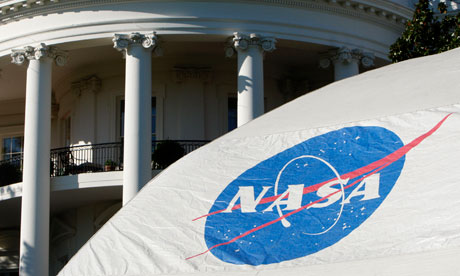Nasa is facing an extraordinary backlash from US researchers after it emerged that the space agency has banned Chinese scientists, including those working at US institutions, from a conference on grounds of national security.
Nasa officials rejected applications from Chinese nationals who hoped to attend the meeting at the agency's Ames research centre in California next month citing a law, passed in March, which prohibits anyone from China setting foot in a Nasa building.
The law is part of a broad and aggressive move initiated by congressman Frank Wolf, chair of the House appropriations committee, which has jurisdiction over Nasa. It aims to restrict the foreign nationals' access to Nasa facilities, ostensibly to counter espionage.
But the ban has angered many US scientists who say Chinese students and researchers in their labs are being discriminated against. A growing number of US scientists have now decided to boycott the meeting in protest, with senior academics withdrawing individually, or pulling out their entire research groups.
The conference is being held for US and international teams who work on Nasa's Kepler space telescope programme, which has been searching the cosmos for signs of planets beyond our solar system. The meeting is the most important event in the academic calendar for scientists who specialise in the field.
Alan Boss, co-organiser of the Kepler conference, refused to discuss the issue, but said: "This is not science, it's politics unfortunately."
Geoff Marcy, an astronomy professor at the University of California, Berkeley, who has been tipped to win a Nobel prize for his pioneering work on exoplanets, or planets outside the solar system, called the ban "completely shameful and unethical".
In an email sent to the conference organisers, Marcy said: "In good conscience, I cannot attend a meeting that discriminates in this way. The meeting is about planets located trillions of miles away, with no national security implications," he wrote.
"It is completely unethical for the United States of America to exclude certain countries from pure science research," Marcy told the Guardian. "It's an ethical breach that is unacceptable. You have to draw the line."
Debra Fischer, professor of astronomy at Yale University, said she became aware of the ban only when a Chinese post-doctoral student in her lab, Ji Wang, was rejected from the conference. When Nasa confirmed that Ji was banned because of his nationality, Fischer decided to pull out of the meeting. She told her students: "I cannot say don't go, but I'm boycotting the meeting." Her team followed suit and has withdrawn from the meeting.
The law allows Nasa to apply for a waiver against the ban in special circumstances, but any appeal would have been rejected under a moratorium that has been introduced by the agency's administrator, Charles Bolden.
Chinese applicants were told they could not attend the conference in an email sent by Mark Messersmith, a Kepler project specialist at Nasa Ames. "Unfortunately … federal legislation passed last March forbids us from hosting any citizens of the People's Republic of China at a conference held at facilities of the National Aeronautics and Space Administration. Regarding those who are already working at other institutions in the US, due to security issues resulting from recent Congressional actions, they are under the same constraints," according to the email, seen by the Guardian.
The recent Congressional action refers to a broader law passed in July which prohibits Nasa funds from being used to participate or collaborate with China in any way. The law has raised fears among some Nasa-funded scientists that they will have to sever ties with their Chinese collaborators, and no longer take on Chinese students.
Marcy said the law would damage relationships built up between US and Chinese researchers that could be valuable lines of communication if conflicts arose between the two nations in the future.
Sir Martin Rees, Britain's astronomer royal, said he "fully supported" Marcy's position and called the ban "a deplorable 'own goal' by the US".
Chris Lintott, an astronomer at Oxford University, called for a total boycott of the conference until the situation had been resolved. "I'm shocked and upset by the way this policy has been applied. Science is supposed to be open to all and restricting those who can attend by nationality goes against years of practice, going right back to cold war conferences of Russian and western physicists," he said. "The Kepler team should move their conference somewhere else – and I hope everyone boycotts until they do."






